Colorado Civil Rights Commission Receives Scathing Remarks From SCOTUS
It Is So Ordered: Not A Wedding Cake But Laws That Prohibit Discrimination On The Basis Of Religion As Well As Sexual Orientation
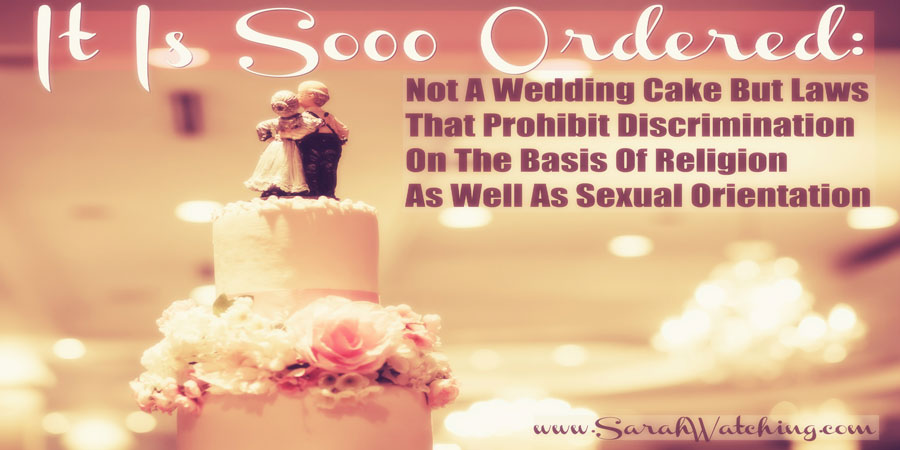
Can you believe we needed a Supreme Court ruling to tell us to act on principle and not emotion?
In the post-Soetoro days of an emboldened radical left slice of America stomping their feet over perceived discrimination while trampling on the basic liberties of others, in a word—yes.
The American left has become so intolerant of any differing opinion/lifestyle/[insert noun here], that only a decision from the Supreme Court can put them down for a time.
Justice Thomas Cites Laws Calling Out Prevailing Liberal Bias Of The Times
Justice Thomas, who specifically addresses the issue of free speech in his concurring opinion on Masterpiece Cakeshop, LTD. v. Colorado Civil Rights Commission, cites two SCOTUS precedents that perhaps most succinctly scolds the prevailing liberal bias of the times:
“It is one thing . . . to conclude that the Constitution protects a right to same-sex marriage; it is something else to portray everyone who does not share [that view] as bigoted” and unentitled to express a different view. Id., at ___ (ROBERTS, C. J., dissenting) (slip op., at 29).
…But, in future cases, the freedom of speech could be essential to preventing Obergefell from being used to “stamp out every vestige of dissent” and “vilify Americans who are unwilling to assent to the new orthodoxy.” Id., at ___ (ALITO, J., dissenting) (slip op., at 6). If that freedom is to maintain its vitality, reasoning like the Colorado Court of Appeals’ must be rejected.
Greatness Ascribed To SCOTUS By The Founders
While concurring with some who have described the Masterpiece Cakeshop decision a “narrow” victory for religious freedom, it is also actually quite revolutionary and indicative of the greatness ascribed to the Supreme Court by the founders.
The majority opinion describes, first and foremost, the animus and intolerance shown toward religious persons and viewpoints. Citing three cases—all in Colorado and judged by the same Commission—the SCOTUS has effectively highlighted the bias and hypocrisy of leftist judges legislating from the bench and their unwillingness and inability to judge fairly. In other words, this is a great win for the first amendment’s freedom of speech and free exercise of religion.
Blatant (and Typical) Hypocrisy Of The Left
The hypocrisy of the left is so blatant that normal persons continually ask “Don’t they, Can’t they, (the left) see their own hypocrisy and double standards?” As hard as it is to fathom for critical thinking persons, the short answer is “No, they are unwilling, and therefore unable, to see their own hypocrisy and double standards.” To use a biblical term, their minds have been darkened.
For these people, who adhere strongly to communist thinking regardless of whether or not they actually know enough to identify as “Communist”, the issue is never the issue. The issue, i.e. the rights of “identity group X,” whereby the group’s rights become an entitlement at all costs, regardless of trampling on “basic right Y” of “non-leftist person or group Y“ is the issue. Communists/socialists/leftists/Democrats are out to steal, kill, and destroy.
Future Wedding Cakes And Other Wedding Paraphernalia
Leftist judges in lower courts must take the Masterpiece Cakeshop opinion into consideration before deciding cases based on the side that fits their personal agenda and/or their communist worldview. If they do not, and the case proceeds to the Supreme Court, it will gladly and quickly be thrown back. A precedent is now on the books that lower courts cannot show hostility to religious persons or viewpoints, and/or imbibe in other adverse failures in taking sincere religious beliefs into consideration. After SCOTUS rejects a few of these, and there will be more, leftists judges will learn. They will be indoctrinated to think according to the Constitution of the United States instead of any manifesto they have personally embraced.
Typical Leading Paragraphs Reporting Supreme Court Decision
The leading paragraphs on most major news outlets on Monday morning, June 4, 2018, regarding the decision were as follows:
The Supreme Court granted a narrow victory to people of faith on Monday, holding 7-2 that the Constitution did not allow the Colorado Civil Rights Commission to order Christian baker Jack Phillips to bake a wedding cake for same-sex weddings because a commissioner said Phillips’ Christian beliefs on marriage were “despicable.”
The Court left open for another case the broader question of whether the government can force people of faith to participate in same-sex weddings when the government does not openly show open hostility to their religious beliefs.
Paragraph #1 is a grave understatement. The Commission called Phillips’ beliefs much more than “despicable” even comparing his justification for not making the cake akin to slavery and the Holocaust. (Does that sound familiar?) In general, respectful consideration was not shown to Phillips at all. Paragraph #2’s assessment is questionable when reading the full opinion of Justice Kennedy, as well as the concurring statements of Justice Gorsuch and Justice Thomas.
If You Think About It, “Narrow” Is Okay
From now until Jesus returns another factor must be kept in mind anytime the Court hands down an opinion regarding religious freedom. An overarching reason that the Court must resist putting forth wide sweeping legislation concerning religious exercise over and above the civil rights of others is because of another area of U.S. law that the communist/liberals have ruined.
The leniency and abuse of immigration laws over the first 16 years of the 21st century, along with the 44th administration’s politicized and weaponized FBI, CIA, and National Security, all with political (and perhaps religious) ties to Islam, and the placement of members of the Muslim Brotherhood in the White House, the question must be taken seriously “do we really know who is living in the U.S.?” Apparently the FBI knew but didn’t act in 2001, and again with the Ft. Hood shooting, and again with the San Bernadino shooting, and again with the Pulse Nightclub shooting–the FBI had prior knowledge of all of these people and their ties to radical Islam including the 9/11 criminals. Then there’s the issue of the 2014-2016 influx of unvetted Muslim refugees and associated chain migrants.
For this reason, the Court must be careful not to open a floodgate of “religious” freedoms that can be used, and defended by leftist lawyers, which are clear violations of the life, liberty, and pursuit of happiness of U.S. citizens. For instance murder, rape, stabbing, being run over by a vehicle (all in the name of a god), etc., can never be allowed to be defended in the name of religion as it is in some Muslim majority countries. Some Muslims are modern, but the majority are fundamentalist, uncivil, and have no tolerance toward any other religions. Sharia Law stands in stark contrast to the freedoms found in the U.S. Constitution and the values held in America, and quite frankly, has absolutely no place in the U.S.
Masterpiece Cakeshop v. Colorado Civil Rights Commission Is A Must Read
The Masterpiece Cakeshop v Colorado Civil Rights Commission full decision can be read here.
You really owe it to yourself to read this entire SCOTUS opinion (skip Ruth Bader Ginsburg’s dissent *SHOCK!* unless you want to bone up on Communist Studies 101). The opinion goes head on with the kneejerk bullying and name-calling from radical leftists.
Religious people, specifically Christians and Jews, must stay educated on these issues in order to stand up for ourselves, our beliefs, and more importantly our liberties in the greatest democracy in the history of the world.
Following are some excerpts from Justice Kennedy, Justice Gorsuch, and Justice Thomas. I have attempted to maintain context as much as possible. Please see the full decision for full context when in question.
Justice Kennedy Delivered The Opinion Of The Court
.,,,the Colorado Civil Rights Commission’s consideration of this case was inconsistent with the State’s obligation of religious neutrality
(Kennedy, pp. 2-3)
Whatever the confluence of speech and free exercise principles might be in some cases, the Colorado Civil Rights Commission’s consideration of this case was inconsistent with the State’s obligation of religious neutrality. The reason and motive for the baker’s refusal were based on his sincere religious beliefs and convictions. The Court’s precedents make clear that the baker, in his capacity as the owner of a business serving the public, might have his right to the free exercise of religion limited by generally applicable laws. Still, the delicate question of when the free exercise of his religion must yield to an otherwise valid exercise of state power needed to be determined in an adjudication in which religious hostility on the part of the State itself would not be a factor in the balance the State sought to reach. That requirement, however, was not met here. When the Colorado Civil Rights Commission considered this case, it did not do so with the religious neutrality that the Constitution requires.
Given all these considerations, it is proper to hold that whatever the outcome of some future controversy involving facts similar to these, the Commission’s actions here violated the Free Exercise Clause; and its order must be set aside.
Still, the delicate question of when the free exercise of his religion must yield to an otherwise valid exercise of state power needed to be determined in an adjudication in which religious hostility on the part of the State itself would not be a factor in the balance the State sought to reach. That requirement, however, was not met here. When the Colorado Civil Rights Commission considered this case, it did not do so with the religious neutrality that the Constitution requires.
(Kennedy, p. 11)
…As Phillips would see the case, this contention has a significant First Amendment speech component and implicates his deep and sincere religious beliefs. In this context the baker likely found it difficult to find a line where the customers’ rights to goods and services became a demand for him to exercise the right of his own personal expression for their message, a message he could not express in a way consistent with his religious beliefs.
(Kennedy, pp. 12-16)
The neutral and respectful consideration to which Phillips was entitled was compromised here, however. The Civil Rights Commission’s treatment of his case has some elements of a clear and impermissible hostility toward the sincere religious beliefs that motivated his objection.
The Civil Rights Commission’s treatment of [Phillips’] case has some elements of a clear and impermissible hostility toward the sincere religious beliefs that motivated his objection.
That hostility surfaced at the Commission’s formal, public hearings, as shown by the record. On May 30, 2014, the seven-member Commission convened publicly to consider Phillips’ case. At several points during its meeting, commissioners endorsed the view that religious beliefs cannot legitimately be carried into the public sphere or commercial domain, implying that religious beliefs and persons are less than fully welcome in Colorado’s business community. One commissioner suggested that Phillips can believe “what he wants to believe,” but cannot act on his religious beliefs “if he decides to do business in the state.” Tr. 23. A few moments later, the commissioner restated the same position: “[I]f a businessman wants to do business in the state and he’s got an issue with the— the law’s impacting his personal belief system, he needs to look at being able to compromise.” Id., at 30. Standing alone, these statements are susceptible of different interpretations. On the one hand, they might mean simply that a business cannot refuse to provide services based on sexual orientation, regardless of the proprietor’s personal views. On the other hand, they might be seen as inappropriate and dismissive comments showing lack of due consideration for Phillips’ free exercise rights and the dilemma he faced. In view of the comments that followed, the latter seems the more likely.
One commissioner suggested that Phillips can believe “what he wants to believe,” but cannot act on his religious beliefs “if he decides to do business in the state.” ,,,“[I]f a businessman wants to do business in the state and he’s got an issue with the— the law’s impacting his personal belief system, he needs to look at being able to compromise.”
On July 25, 2014, the Commission met again. This meeting, too, was conducted in public and on the record. On this occasion another commissioner made specific reference to the previous meeting’s discussion but said far more to disparage Phillips’ beliefs. The commissioner stated:
The Civil Right commissioners stated…Freedom of religion and religion has been used to justify all kinds of discrimination throughout history, whether it be slavery, whether it be the holocaust… And to me it is one of the most despicable pieces of rhetoric that people can use to—to use their religion to hurt others.” [Does this sound remotely familiar?]
“I would also like to reiterate what we said in the hearing or the last meeting. Freedom of religion and religion has been used to justify all kinds of discrimination throughout history, whether it be slavery, whether it be the holocaust, whether it be—I mean, we—we can list hundreds of situations where freedom of religion has been used to justify discrimination. And to me it is one of the most despicable pieces of rhetoric that people can use to—to use their religion to hurt others.” Tr. 11–12.
To describe a man’s faith as “one of the most despicable pieces of rhetoric that people can use” is to disparage his religion in at least two distinct ways: by describing it as despicable, and also by characterizing it as merely rhetorical—something insubstantial and even insincere. The commissioner even went so far as to compare Phillips’ invocation of his sincerely held religious beliefs to defenses of slavery and the Holocaust. This sentiment is inappropriate for a Commission charged with the solemn responsibility of fair and neutral enforcement of Colorado’s anti-discrimination law—a law that protects discrimination on the basis of religion as well as sexual orientation.
To describe a man’s faith as “one of the most despicable pieces of rhetoric that people can use” is to disparage his religion in at least two distinct ways: by describing it as despicable, and also by characterizing it as merely rhetorical—something insubstantial and even insincere. The commissioner even went so far as to compare Phillips’ invocation of his sincerely held religious beliefs to defenses of slavery and the Holocaust. This sentiment is inappropriate for a Commission charged with the solemn responsibility of fair and neutral enforcement of Colorado’s anti-discrimination law—a law that protects discrimination on the basis of religion as well as sexual orientation.
…the Court cannot avoid the conclusion that these statements cast doubt on the fairness and impartiality of the Commission’s adjudication of Phillips’ case.
The record shows no objection to these comments from other commissioners. And the later state-court ruling reviewing the Commission’s decision did not mention those comments, much less express concern with their content. Nor were the comments by the commissioners disavowed in the briefs filed in this Court. For these reasons, the Court cannot avoid the conclusion that these statements cast doubt on the fairness and impartiality of the Commission’s adjudication of Phillips’ case. Members of the Court have disagreed on the question whether statements made by lawmakers may properly be taken into account in determining whether a law intentionally discriminates on the basis of religion. See Church of Lukumi Babalu Aye, Inc. v. Hialeah, 508 U. S. 520, 540– 542 (1993); id., at 558 (Scalia, J., concurring in part and concurring in judgment). In this case, however, the remarks were made in a very different context—by an adjudicatory body deciding a particular case.
Another indication of hostility is the difference in treatment between Phillips’ case and the cases of other bakers who objected to a requested cake on the basis of conscience and prevailed before the Commission.
Another indication of hostility is the difference in treatment between Phillips’ case and the cases of other bakers who objected to a requested cake on the basis of conscience and prevailed before the Commission. …on at least three other occasions…
As noted above, on at least three other occasions the Civil Rights Division considered the refusal of bakers to create cakes with images that conveyed disapproval of same-sex marriage, along with religious text. Each time, the Division found that the baker acted lawfully in refusing service. It made these determinations because, in the words of the Division, the requested cake included “wording and images [the baker] deemed derogatory,” Jack v. Gateaux, Ltd., Charge No. P20140071X, at 4; featured “language and images [the baker] deemed hateful,” Jack v. Le Bakery Sensual, Inc., Charge No. P20140070X, at 4; or displayed a message the baker “deemed as discriminatory, Jack v. Azucar Bakery, Charge No. P20140069X, at 4.
The treatment of the conscience-based objections at issue in these three cases contrasts with the Commission’s treatment of Phillips’ objection. The Commission ruled against Phillips in part on the theory that any message the requested wedding cake would carry would be attributed to the customer, not to the baker. Yet the Division did not address this point in any of the other cases with respect to the cakes depicting anti-gay marriage symbolism. Additionally, the Division found no violation of CADA in the other cases in part because each bakery was willing to sell other products, including those depicting Christian themes, to the prospective customers. But the Commission dismissed Phillips’ willingness to sell “birthday cakes, shower cakes, [and] cookies and brownies,” App. 152, to gay and lesbian customers as irrelevant. The treatment of the other cases and Phillips’ case could reasonably be interpreted as being inconsistent as to the question of whether speech is involved, quite apart from whether the cases should ultimately be distinguished. In short, the Commission’s consideration of Phillips’ religious objection did not accord with its treatment of these other objections.
Before the Colorado Court of Appeals, Phillips protested that this disparity in treatment reflected hostility on the part of the Commission toward his beliefs. He argued that the Commission had treated the other bakers’ conscience-based objections as legitimate, but treated his as illegitimate—thus sitting in judgment of his religious beliefs themselves. The Court of Appeals addressed the disparity only in passing and relegated its complete analysis of the issue to a footnote. There, the court stated that “[t]his case is distinguishable from the Colorado Civil Rights Division’s recent findings that [the other bakeries] in Denver did not discriminate against a Christian patron on the basis of his creed” when they refused to create the requested cakes. 370 P. 3d, at 282, n. 8. In those cases, the court continued, there was no impermissible discrimination because “the Division found that the bakeries . . . refuse[d] the patron’s request . . . because of the offensive nature of the requested message.” Ibid.
A principled rationale for the difference in treatment of these two instances cannot be based on the government’s own assessment of offensiveness….the Commission’s treatment of Phillips’ case violated the State’s duty under the First Amendment not to base laws or regulations on hostility to a religion or religious viewpoint.
A principled rationale for the difference in treatment of these two instances cannot be based on the government’s own assessment of offensiveness.
(Kennedy, pp. 16-18)
For the reasons just described, the Commission’s treatment of Phillips’ case violated the State’s duty under the First Amendment not to base laws or regulations on hostility to a religion or religious viewpoint.
In Church of Lukumi Babalu Aye, supra, the Court made clear that the government, if it is to respect the Constitution’s guarantee of free exercise, cannot impose regulations that are hostile to the religious beliefs of affected citizens and cannot act in a manner that passes judgment upon or presupposes the illegitimacy of religious beliefs and practices. The Free Exercise Clause bars even “subtle departures from neutrality” on matters of religion. Id., at 534. Here, that means the Commission was obliged under the Free Exercise Clause to proceed in a manner neutral toward and tolerant of Phillips’ religious beliefs. The Constitution “commits government itself to religious tolerance, and upon even slight suspicion that proposals for state intervention stem from animosity to religion or distrust of its practices, all officials must pause to remember their own high duty to the Constitution and to the rights it secures.” Id., at 547.…It hardly requires restating that government has no role in deciding or even suggesting whether the religious ground for Phillips’ conscience based objection is legitimate or illegitimate. On these facts, the Court must draw the inference that Phillips’ religious objection was not considered with the neutrality that the Free Exercise Clause requires.
…the Court made clear that the government, if it is to respect the Constitution’s guarantee of free exercise, cannot impose regulations that are hostile to the religious beliefs of affected citizens and cannot act in a manner that passes judgment upon or presupposes the illegitimacy of religious beliefs and practices. The Free Exercise Clause bars even “subtle departures from neutrality” on matters of religion. …It hardly requires restating that government has no role in deciding or even suggesting whether the religious ground for Phillips’ conscience based objection is legitimate or illegitimate. On these facts, the Court must draw the inference that Phillips’ religious objection was not considered with the neutrality that the Free Exercise Clause requires.
While the issues here are difficult to resolve, it must be concluded that the State’s interest could have been weighed against Phillips’ sincere religious objections in a way consistent with the requisite religious neutrality that must be strictly observed. The official expressions of hostility to religion in some of the commissioners’ comments—comments that were not disavowed at the Commission or by the State at any point in the proceedings that led to affirmance of the order—were inconsistent with what the Free Exercise Clause requires. The Commission’s disparate consideration of Phillips’ case compared to the cases of the other bakers suggests the same. For these reasons, the order must be set aside.
The Commission’s hostility was inconsistent with the First Amendment’s guarantee that our laws be applied in a manner that is neutral toward religion.
(Kennedy, p. 18)
The Commission’s hostility was inconsistent with the First Amendment’s guarantee that our laws be applied in a manner that is neutral toward religion. Phillips was entitled to a neutral decision maker who would give full and fair consideration to his religious objection as he sought to assert it in all of the circumstances in which this case was presented, considered, and decided. In this case the adjudication concerned a context that may well be different going forward in the respects noted above. However later cases raising these or similar concerns are resolved in the future, for these reasons the rulings of the Commission and of the state court that enforced the Commission’s order must be invalidated.
The outcome of cases like this in other circumstances must await further elaboration in the courts, all in the context of recognizing that these disputes must be resolved with tolerance, without undue disrespect to sincere religious beliefs, and without subjecting gay persons to indignities when they seek goods and services in an open market.
The judgment of the Colorado Court of Appeals is reversed.
It is so ordered.
The outcome of cases like this in other circumstances must await further elaboration in the courts, all in the context of recognizing that these disputes must be resolved with tolerance, without undue disrespect to sincere religious beliefs, and without subjecting gay persons to indignities when they seek goods and services in an open market.
From Justice Gorsuch, with whom Justice Alito joins, concurring.
(Gorsuch, p. 1)
In Employment Div., Dept. of Human Resources of Ore. v. Smith, this Court held that a neutral and generally applicable law will usually survive a constitutional free exercise challenge. 494 U. S. 872, 878–879 (1990). …But we know this with certainty: when the government fails to act neutrally toward the free exercise of religion, it tends to run into trouble. Then the government can prevail only if it satisfies strict scrutiny, showing that its restrictions on religion both serve a compelling interest and are narrowly tailored. Church of Lukumi Babalu Aye, Inc. v. Hialeah, 508 U. S. 520, 546 (1993).
…But we know this with certainty: when the government fails to act neutrally toward the free exercise of religion, it tends to run into trouble.
(Gorsuch, p. 4)
The facts show that the two cases share all legally salient features. In both cases, the effect on the customer was the same: bakers refused service to persons who bore a statutorily protected trait (religious faith or sexual orientation). But in both cases the bakers refused service intending only to honor a personal conviction. To be sure, the bakers knew their conduct promised the effect of leaving a customer in a protected class unserved. But there’s no indication the bakers actually intended to refuse service because of a customer’s protected characteristic. … In both cases, it was the kind of cake, not the kind of customer, that mattered to the bakers.
(Gorsuch, pp. 6-7)
In the end, the Commission’s decisions simply reduce to this: it presumed that Mr. Phillip harbored an intent to discriminate against a protected class in light of the foreseeable effects of his conduct, but it declined to presume the same intent in Mr. Jack’s case even though the effects of the bakers’ conduct were just as foreseeable. Underscoring the double standard, a state appellate court said that “no such showing” of actual “animus”—or intent to discriminate against persons in a protected class—was even required in Mr. Phillips’s case. 370 P. 3d, at 282. (p.6 pdf p31)
Underscoring the double standard, a state appellate court said that “no such showing” of actual “animus”—or intent to discriminate against persons in a protected class—was even required in Mr. Phillips’s case.
The Commission cannot have it both ways. The Commission cannot slide up and down the mens rea scale, picking a mental state standard to suit its tastes depending on its sympathies. Either actual proof of intent to discriminate on the basis of membership in a protected class is required (as the Commission held in Mr. Jack’s case), or it is sufficient to “presume” such intent from the knowing failure to serve someone in a protected class (as the Commission held in Mr. Phillips’s case). Perhaps the Commission could have chosen either course as an initial matter. But the one thing it can’t do is apply a more generous legal test to secular objections than religious ones. See Church of Lukumi Babalu Aye, 508 U. S., at 543–544. That is anything but the neutral treatment of religion.
Underscoring the double standard, a state appellate court said that “no such showing” of actual “animus”—or intent to discriminate against persons in a protected class—was even required in Mr. Phillips’s case. …But the one thing it can’t do is apply a more generous legal test to secular objections than religious ones.
The real explanation for the Commission’s discrimination soon comes clear, too—and it does anything but help its cause. This isn’t a case where the Commission self-consciously announced a change in its legal rule in all public accommodation cases. Nor is this a case where the Commission offered some persuasive reason for its discrimination that might survive strict scrutiny. Instead, as the Court explains, it appears the Commission wished to condemn Mr. Phillips for expressing just the kind of “irrational” or “offensive . . . message” that the bakers in the first case refused to endorse. Ante, at 16. Many may agree with the Commission and consider Mr. Phillips’s religious beliefs irrational or offensive. Some may believe he misinterprets the teachings of his faith. And, to be sure, this Court has held same-sex marriage a matter of constitutional right and various States have enacted laws that preclude discrimination on the basis of sexual orientation. But it is also true that no bureaucratic judgment condemning a sincerely held religious belief as “irrational” or “offensive” will ever survive strict scrutiny under the First Amendment. In this country, the place of secular officials isn’t to sit in judgment of religious beliefs, but only to protect their free exercise. Just as it is the “proudest boast of our free speech jurisprudence” that we protect speech that we hate, it must be the proudest boast of our free exercise jurisprudence that we protect religious beliefs that we find offensive. See Matal v. Tam, 582 U. S. ___, ___ (2017) (plurality opinion) (slip op., at 25) (citing United States v. Schwimmer, 279 U. S. 644, 655 (1929) (Holmes, J., dissenting)). Popular religious views are easy enough to defend. It is in protecting unpopular religious beliefs that we prove this country’s commitment to serving as a refuge for religious freedom. See Church of Lukumi Babalu Aye, supra, at 547; Thomas v. Review Bd. of Indiana Employment Security Div., 450 U. S. 707, 715–716 (1981); Wisconsin v. Yoder, 406 U. S. 205, 223–224 (1972); Cantwell v. Connecticut, 310 U. S. 296, 308–310 (1940).
Instead, as the Court explains, it appears the Commission wished to condemn Mr. Phillips for expressing just the kind of “irrational” or “offensive . . . message” that the bakers in the first case refused to endorse. …But it is also true that no bureaucratic judgment condemning a sincerely held religious belief as “irrational” or “offensive” will ever survive strict scrutiny under the First Amendment. In this country, the place of secular officials isn’t to sit in judgment of religious beliefs, but only to protect their free exercise….Popular religious views are easy enough to defend. It is in protecting unpopular religious beliefs that we prove this country’s commitment to serving as a refuge for religious freedom.
(Gorsuch, pp. 10-11)
…Of course, under Smith a vendor cannot escape a public accommodations law just because his religion frowns on it. But for any law to comply with the First Amendment and Smith, it must be applied in a manner that treats religion with neutral respect. That means the government must apply the same level of generality across cases—and that did not happen here.
There is another problem with sliding up the generality scale: it risks denying constitutional protection to religious beliefs that draw distinctions more specific than the government’s preferred level of description. …And his religious beliefs are entitled to no less respectful treatment than the bakers’ secular beliefs in Mr. Jack’s case.
There is another problem with sliding up the generality scale: it risks denying constitutional protection to religious beliefs that draw distinctions more specific than the government’s preferred level of description. To some, all wedding cakes may appear indistinguishable. But to Mr. Phillips that is not the case—his faith teaches him otherwise. And his religious beliefs are entitled to no less respectful treatment than the bakers’ secular beliefs in Mr. Jack’s case. This Court has explained these same points “[r]epeatedly and in many different contexts” over many years. Smith, 494 U. S. at 887. For example, in Thomas a faithful Jehovah’s Witness and steel mill worker agreed to help manufacture sheet steel he knew might find its way into armaments, but he was unwilling to work on a fabrication line producing tank turrets. 450 U. S., at 711. Of course, the line Mr. Thomas drew wasn’t the same many others would draw and it wasn’t even the same line many other members of the same faith would draw. Even so, the Court didn’t try to suggest that making steel is just making steel. Or that to offend his religion the steel needed to be of a particular kind or shape. Instead, it recognized that Mr. Thomas alone was entitled to define the nature of his religious commitments—and that those commitments, as defined by the faithful adherent, not a bureaucrat or judge, are entitled to protection under the First Amendment. Id., at 714–716; see also United States v. Lee, 455 U. S. 252, 254–255 (1982); Smith, supra, at 887 (collecting authorities).
…it recognized that Mr. Thomas alone was entitled to define the nature of his religious commitments—and that those commitments, as defined by the faithful adherent, not a bureaucrat or judge, are entitled to protection under the First Amendment.
Justice Thomas, with whom Justice Gorsuch joins, concurring in part and concurring in the judgment.
(Justice Thomas, pp. 1-2)
I agree that the Colorado Civil Rights Commission (Commission) violated Jack Phillips’ right to freely exercise his religion…
While Phillips rightly prevails on his free-exercise claim, I write separately to address his free-speech claim…
…Phillips could post a disclaimer… …This reasoning flouts bedrock principles of our free-speech jurisprudence and would justify virtually any law that compels individuals to speak. It should not pass without comment.
Even after describing his conduct this way, the Court of Appeals concluded that Phillips’ conduct was not expressive and was not protected speech. It reasoned that an outside observer would think that Phillips was merely complying with Colorado’s public-accommodations law, not expressing a message, and that Phillips could post a disclaimer to that effect. This reasoning flouts bedrock principles of our free-speech jurisprudence and would justify virtually any law that compels individuals to speak. It should not pass without comment.
(Thomas, pp. 11-14)
…it is punishing him because he refuses to create custom wedding cakes that express approval of same-sex marriage. In cases like this one, our precedents demand “‘the most exacting scrutiny.’”
Here, however, Colorado would not be punishing Phillips if he refused to create any custom wedding cakes; it is punishing him because he refuses to create custom wedding cakes that express approval of same-sex marriage. In cases like this one, our precedents demand “‘the most exacting scrutiny.’” Johnson, 491 U. S., at 412; accord, Holder v. Humanitarian Law Project, 561 U. S. 1, 28 (2010).
According to the individual respondents, Colorado can compel Phillips’ speech to prevent him from “‘denigrat[ing] the dignity’” of same-sex couples, “‘assert[ing] [their] inferiority,’” and subjecting them to “‘humiliation, frustration, and embarrassment.’” …These justifications are completely foreign to our free speech jurisprudence.
The Court of Appeals did not address whether Colorado’s law survives strict scrutiny, and I will not do so in the first instance. There is an obvious flaw, however, with one of the asserted justifications for Colorado’s law. According to the individual respondents, Colorado can compel Phillips’ speech to prevent him from “‘denigrat[ing] the dignity’” of same-sex couples, “‘assert[ing] [their] inferiority,’” and subjecting them to “‘humiliation, frustration, and embarrassment.’” Brief for Respondents Craig et al. 39 (quoting J. E. B. v. Alabama ex rel. T. B., 511 U. S. 127, 142 (1994); Heart of Atlanta Motel, Inc. v. United States, 379 U. S. 241, 292 (1964) (Goldberg, J., concurring)). These justifications are completely foreign to our free speech jurisprudence.
States cannot punish protected speech because some group finds it offensive, hurtful, stigmatic, unreasonable, or undignified. “If there is a bedrock principle underlying the First Amendment, it is that the government may not prohibit the expression of an idea simply because society finds the idea itself offensive or disagreeable.” …As the Court reiterates today, “it is not . . . the role of the State or its officials to prescribe what shall be offensive.”
States cannot punish protected speech because some group finds it offensive, hurtful, stigmatic, unreasonable, or undignified. “If there is a bedrock principle underlying the First Amendment, it is that the government may not prohibit the expression of an idea simply because society finds the idea itself offensive or disagreeable.” Johnson, supra, at 414. A contrary rule would allow the government to stamp out virtually any speech at will. See Morse v. Frederick, 551 U. S. 393, 409 (2007) (“After all, much political and religious speech might be perceived as offensive to some”). As the Court reiterates today, “it is not . . . the role of the State or its officials to prescribe what shall be offensive.” Ante, at 16. “‘Indeed, if it is the speaker’s opinion that gives offense, that consequence is a reason for according it constitutional protection.’” Hustler Magazine, Inc. v. Falwell, 485 U. S. 46, 55 (1988); accord, Johnson, supra, at 408–409. If the only reason a public accommodations law regulates speech is “to produce a society free of . . . biases” against the protected groups, that purpose is “decidedly fatal” to the law’s constitutionality, “for it amounts to nothing less than a proposal to limit speech in the service of orthodox expression.” Hurley, 515 U. S., at 578–579; see also United States v. Playboy Entertainment Group, Inc., 529 U. S. 803, 813 (2000) (“Where the designed benefit of a content-based speech restriction is to shield the sensibilities of listeners, the general rule is that the right of expression prevails”). “[A] speech burden based on audience reactions is simply government hostility . . . in a different guise.” Matal v. Tam, 582 U. S. ___, ___ (2017) (KENNEDY, J., concurring in part and concurring in judgment) (slip op., at 4).
Nor does the fact that this Court has now decided Obergefell v. Hodges, 576 U. S. ___ (2015), somehow diminish Phillips’ right to free speech. “It is one thing . . . to conclude that the Constitution protects a right to same-sex marriage; it is something else to portray everyone who does not share [that view] as bigoted” and unentitled to express a different view. Id., at ___ (ROBERTS, C. J., dissenting) (slip op., at 29).“Where the designed benefit of a content-based speech restriction is to shield the sensibilities of listeners, the general rule is that the right of expression prevails”). “[A] speech burden based on audience reactions is simply government hostility . . . in a different guise.”
“It is one thing . . . to conclude that the Constitution protects a right to same-sex marriage; it is something else to portray everyone who does not share [that view] as bigoted” and unentitled to express a different view.
start here In Obergefell, I warned that the Court’s decision would “inevitabl[y] . . . come into conflict” with religious liberty, “as individuals . . . are confronted with demands to participate in and endorse civil marriages between same-sex couples.” 576 U. S., at ___ (dissenting opinion) (slip op., at 15). This case proves that the conflict has already emerged. Because the Court’s decision vindicates Phillips’ right to free exercise, it seems that religious liberty has lived to fight another day. But, in future cases, the freedom of speech could be essential to preventing Obergefell from being used to “stamp out every vestige of dissent” and “vilify Americans who are unwilling to assent to the new orthodoxy.” Id., at ___ (ALITO, J., dissenting) (slip op., at 6). If that freedom is to maintain its vitality, reasoning like the Colorado Court of Appeals’ must be rejected.
Because the Court’s decision vindicates Phillips’ right to free exercise, it seems that religious liberty has lived to fight another day. But, in future cases, the freedom of speech could be essential to preventing Obergefell from being used to “stamp out every vestige of dissent” and “vilify Americans who are unwilling to assent to the new orthodoxy.”

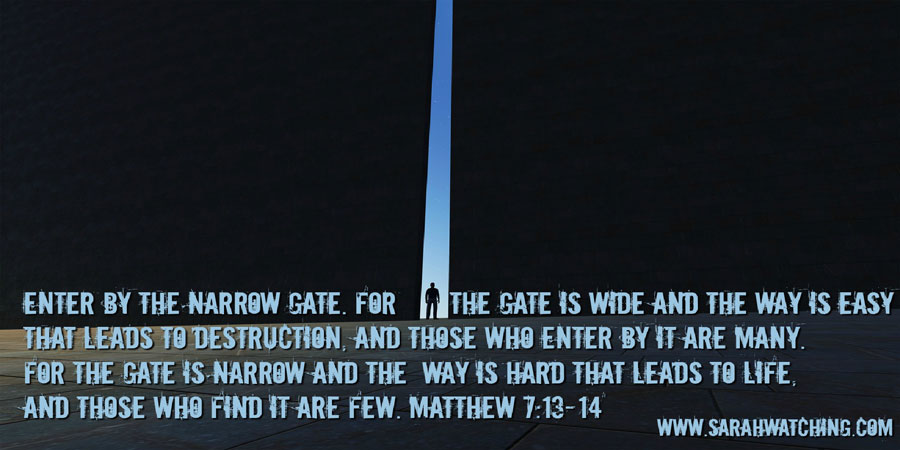
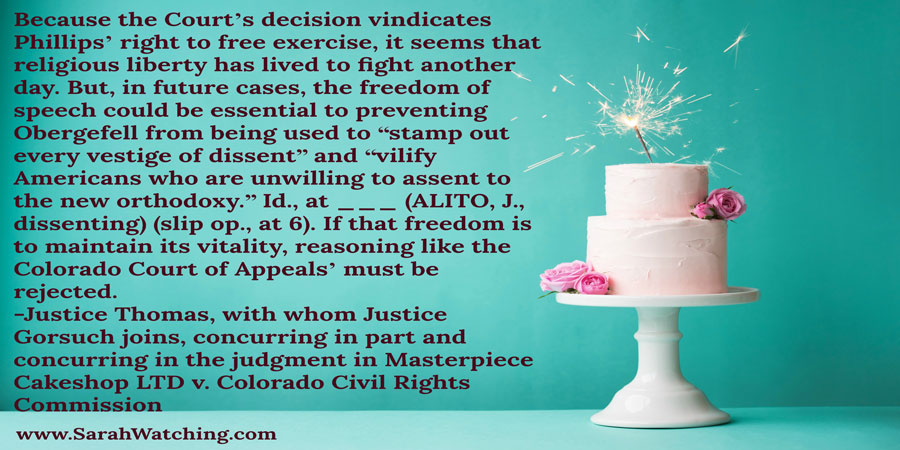
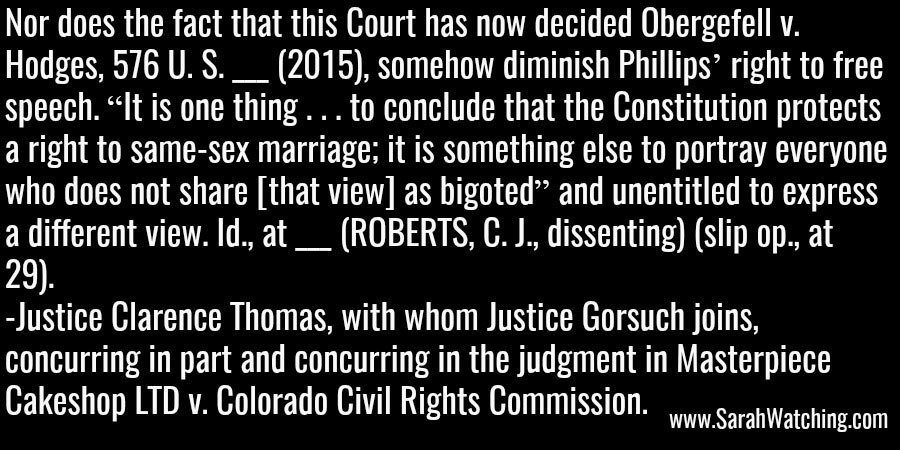
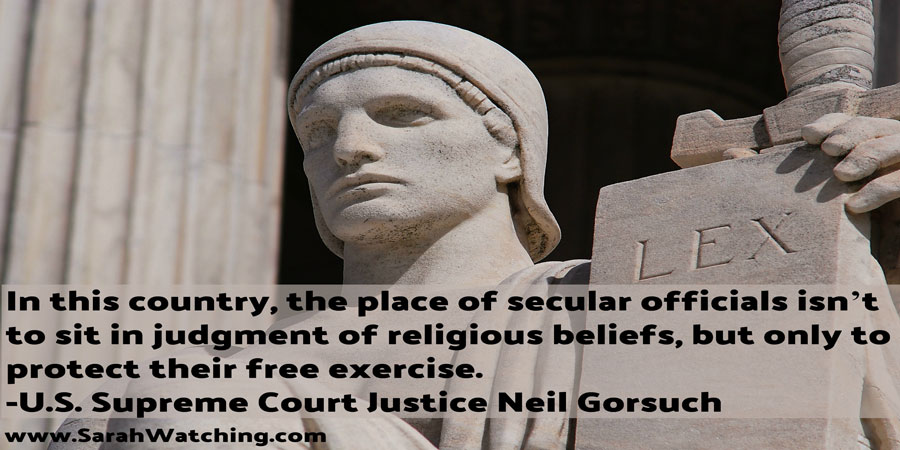
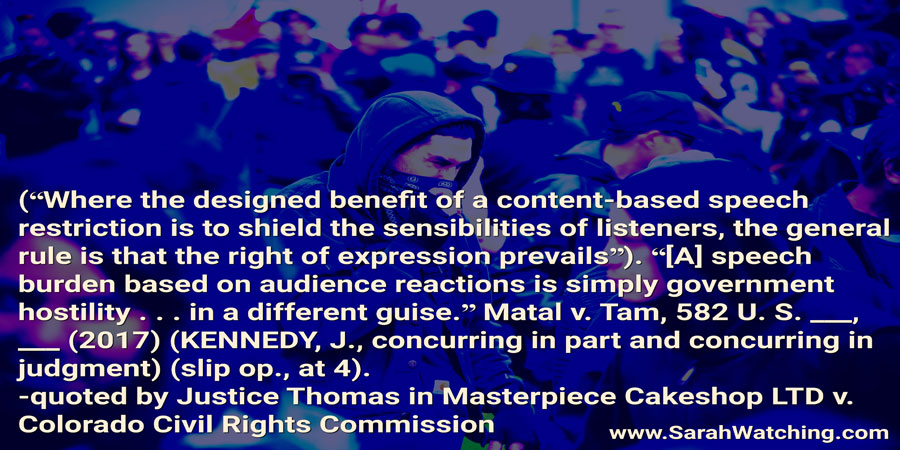
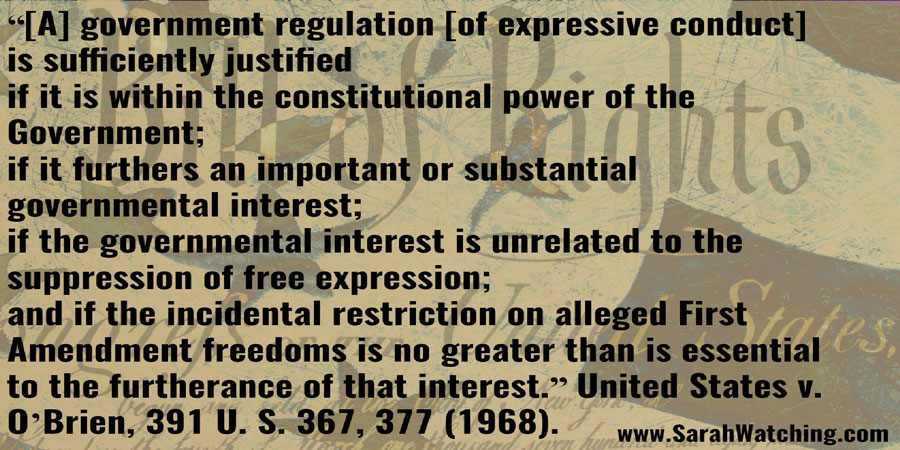

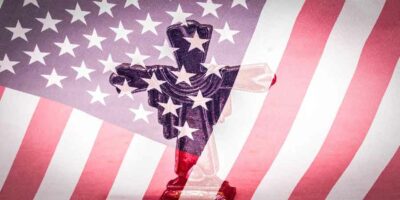
Comments are Closed